The late Anthony Bourdain, a renowned food critic, had this to say about durians: “It smelled like you’d buried somebody holding a big wheel of Stilton in his arms, then dug him up a few weeks later.” Despite this visceral description of the durian’s pungent odour, the fact remains that the King of Fruits is today more popular than ever, not just domestically but internationally too. China has recently approved the large scale importation of frozen fruit from Malaysia in order to satiate a growing Chinese appetite for the large spiky flavour grenade that is the durian. As the durian becomes more of a mainstay in the diet of the world’s most populous nation, it is fitting that we better acquaint ourselves with the health properties of this beloved fruit. When it comes to many fruits we tend to be quite confident in our understanding of the fruit’s nutritional value. After all, an apple a day keeps the doctor away. Who isn’t well aware that lemons and oranges are packed with vitamin C, good for keeping scurvy at bay? Certainly, there is an abundance of anecdotal advice pertaining to the ‘heatiness’ of the durian and the appropriate weather for consumption, but many struggle to ascertain the facts from fiction. 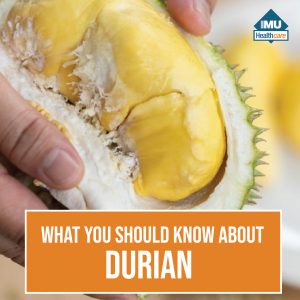
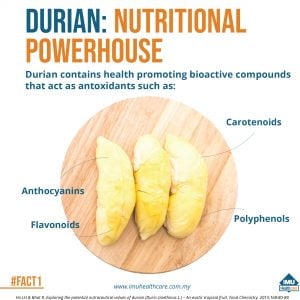
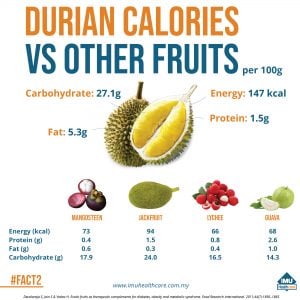 Thankfully, we have experts like Dr Lee Ching Li, a Dietitian from IMU Healthcare, to clear things up. First and foremost, Dr Lee conveys the obvious, if hard to swallow, truth about our favourite smelly fruit: it is packed with calories. With a total of 147 calories for every 100 grams, the King of Fruits truly is the King of Calories, surpassing the mangosteen, jackfruit, lychee and guava. The silver lining? The durian is not just rich in carbohydrates and fats – it is also rich in several antioxidants that can promote health . This means that taken in moderation durian can form part of a healthy diet, but if one were to overindulge it could lead to more harm than good. Ideally, when eating durian with friends and family, one should stick to a portion of two to three seeds. Two seeds contain the same calorie count as one large banana. Five seeds add up to an entire bowl of rice. Meaning that if one were to mindlessly feast upon fifteen seeds at a party, they would consume the caloric equivalent of three bowls of rice! If durian is eaten before or after a meal it is important to be aware of its extra high calorie count, so as to not overeat and put oneself at risk of obesity or diabetes.
Thankfully, we have experts like Dr Lee Ching Li, a Dietitian from IMU Healthcare, to clear things up. First and foremost, Dr Lee conveys the obvious, if hard to swallow, truth about our favourite smelly fruit: it is packed with calories. With a total of 147 calories for every 100 grams, the King of Fruits truly is the King of Calories, surpassing the mangosteen, jackfruit, lychee and guava. The silver lining? The durian is not just rich in carbohydrates and fats – it is also rich in several antioxidants that can promote health . This means that taken in moderation durian can form part of a healthy diet, but if one were to overindulge it could lead to more harm than good. Ideally, when eating durian with friends and family, one should stick to a portion of two to three seeds. Two seeds contain the same calorie count as one large banana. Five seeds add up to an entire bowl of rice. Meaning that if one were to mindlessly feast upon fifteen seeds at a party, they would consume the caloric equivalent of three bowls of rice! If durian is eaten before or after a meal it is important to be aware of its extra high calorie count, so as to not overeat and put oneself at risk of obesity or diabetes.
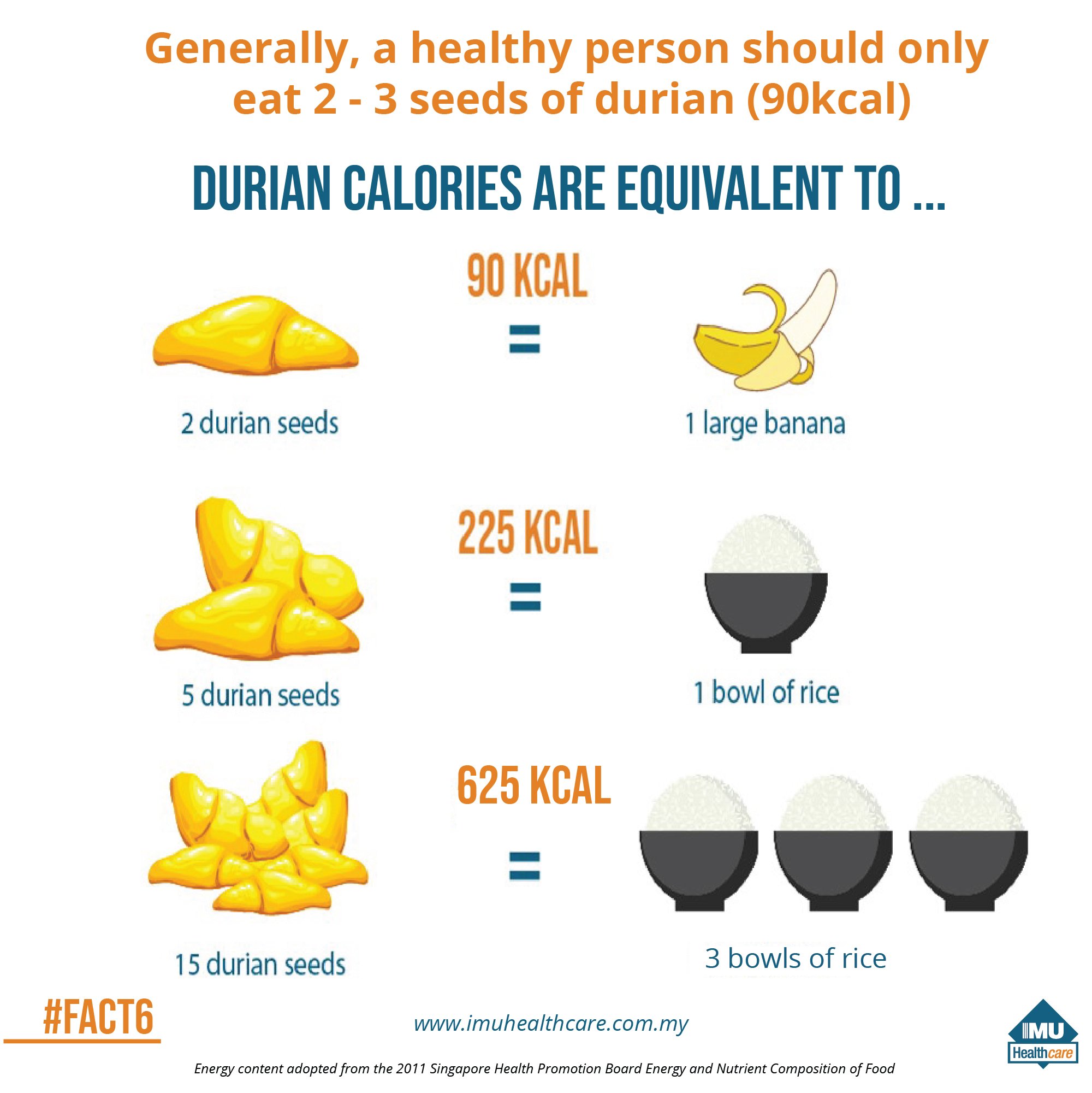
Generally, there are a few groups in particular that should be mindful of how much durian they consume. People who need to lose weight for whatever reason, people who have diabetes and people with high cholesterol all fall into this category. The rich and decadent durian fruit cannot be gorged upon like grapes. Studies have also shown that durian consumption can increase the heart rate of healthy humans , and in lab rats with high blood pressure, durian has shown to increase blood pressure further. For this reason, people with hypertension may want to take some precautions when it comes to the portions and frequency of their durian consumption. Dr Lee advises that people undergoing dialysis may wish to avoid durian, seeing as the mineral rich fruit is packed with potassium, a mineral people undergoing dialysis will likely have trouble excreting from the system. 
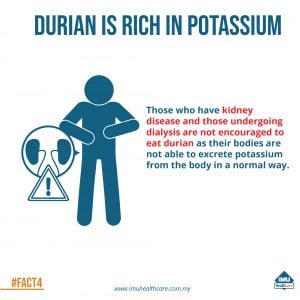
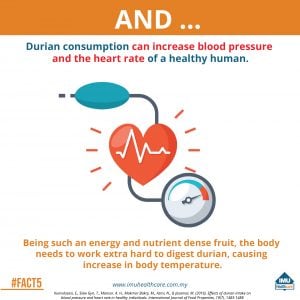 But what does Dr Lee have to say about some common preconceptions we have about durians? Do they really contribute to heatiness? It turns out that this observation is true! Being such an energy and nutrient dense fruit, the body needs to work extra hard to digest durian, causing a genuine, though slight, increase in body temperature. Ever wondered if you could drink alcohol and eat durian at the same time? Well, Dr Lee has some bad news. The durian’s divisive smell is the result of esters and sulphur-containing volatiles (substances that vaporise easily). The volatiles actually reduce the efficiency of an enzyme that helps with the liver’s ability to process alcohol. To make matters worse, many East Asians have an inherited deficiency of the enzyme. All these factors together make durian and drinking a deadly mix.
But what does Dr Lee have to say about some common preconceptions we have about durians? Do they really contribute to heatiness? It turns out that this observation is true! Being such an energy and nutrient dense fruit, the body needs to work extra hard to digest durian, causing a genuine, though slight, increase in body temperature. Ever wondered if you could drink alcohol and eat durian at the same time? Well, Dr Lee has some bad news. The durian’s divisive smell is the result of esters and sulphur-containing volatiles (substances that vaporise easily). The volatiles actually reduce the efficiency of an enzyme that helps with the liver’s ability to process alcohol. To make matters worse, many East Asians have an inherited deficiency of the enzyme. All these factors together make durian and drinking a deadly mix. 
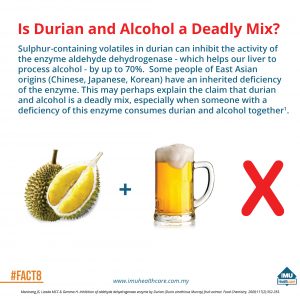 Overall, Dr Lee’s advice is to enjoy durian in moderation, eating enough to get the benefits of its rich nutrients and antioxidants, but not too much that the calories get the better of us. But what about a Chinese Medicine (CM) perspective? Seeing as our friends in China are about to enjoy more durian now than ever before, a CM point of view on durian could soon be crucial to the way many people choose to consume the fruit. Dr Wong Zhi Hang from the International Medical University’s Centre for Complementary and Alternative Medicine (CCAM) shares some insight into the CM opinion on the famous fruit. Chinese Medicine recognises durian as a fruit that can bring many benefits to the body, replenishing the body and leaving people feeling warm and excited. Dr Wong warns that durian in excess can ‘boil’ the body over, generating too much heat and energy. In fact, most CM practitioners would not recommend the intake of other “hot” foods alongside durian, as it increases the risk of overheating. Instead Dr Wong confirms that the age-old Malaysian habit of eating durian with mangosteen is a good idea, promoting smooth bowel movements as both fruits are so rich in fibre. Mangosteen is also able to neutralise the heat of durian as it is a “cold” fruit. Dr Wong also suggests that having some saline water alongside your durian can help vanquish some of the heat, as salt is associated with cooling properties. If you have a cough with expectorate yellow phlegm, the CM opinion is that durian can contribute to phlegm and cause a bit of a nuisance. Nevertheless, the durian gets the CM stamp of approval, so long as you keep the body in balance. Hopefully with the advice of IMU Healthcare’s Dr Lee and IMU’s Dr Wong, all health-conscious Malaysians can rest assured they are equipped with the know-how to responsibly enjoy the King of Fruits. A whole durian a day may not keep the doctor away, but just a few pieces might do the trick!
Overall, Dr Lee’s advice is to enjoy durian in moderation, eating enough to get the benefits of its rich nutrients and antioxidants, but not too much that the calories get the better of us. But what about a Chinese Medicine (CM) perspective? Seeing as our friends in China are about to enjoy more durian now than ever before, a CM point of view on durian could soon be crucial to the way many people choose to consume the fruit. Dr Wong Zhi Hang from the International Medical University’s Centre for Complementary and Alternative Medicine (CCAM) shares some insight into the CM opinion on the famous fruit. Chinese Medicine recognises durian as a fruit that can bring many benefits to the body, replenishing the body and leaving people feeling warm and excited. Dr Wong warns that durian in excess can ‘boil’ the body over, generating too much heat and energy. In fact, most CM practitioners would not recommend the intake of other “hot” foods alongside durian, as it increases the risk of overheating. Instead Dr Wong confirms that the age-old Malaysian habit of eating durian with mangosteen is a good idea, promoting smooth bowel movements as both fruits are so rich in fibre. Mangosteen is also able to neutralise the heat of durian as it is a “cold” fruit. Dr Wong also suggests that having some saline water alongside your durian can help vanquish some of the heat, as salt is associated with cooling properties. If you have a cough with expectorate yellow phlegm, the CM opinion is that durian can contribute to phlegm and cause a bit of a nuisance. Nevertheless, the durian gets the CM stamp of approval, so long as you keep the body in balance. Hopefully with the advice of IMU Healthcare’s Dr Lee and IMU’s Dr Wong, all health-conscious Malaysians can rest assured they are equipped with the know-how to responsibly enjoy the King of Fruits. A whole durian a day may not keep the doctor away, but just a few pieces might do the trick!
| References: |
|---|
| Devalaraja S, Jain S & Yadav H. Exotic fruits as therapeutic complements for diabetes, obesity and metabolic syndrome. Food Research International. 2011;44(7):1856–1865 |
| Ho LH & Bhat R. Exploring the potential nutraceutical values of durian (Durio zinethinus L.) – An exotic tropical fruit. Food Chemistry. 2015;168:80-89. 3 |
| Maninang JS, Lizada MCC & Gemma H. Inhibition of aldehyde dehydrogenase enzyme by Durian (Durio zinethinus Murray) fruit extract. Food Chemistry. 2009;117(2):352-355. |
| Kumolosasi E et al. Effects of durian intake on blood pressure and heart rate in healthy individuals. International Journal of Food Properties. 2016;19(7). doi.org/10.1080/10942912.2015.1083577. |
| Malina J et al. Effects of Durian fruit on blood pressure of spontaneously hypertensive rats. Sains Malaysiana. 2018;47(6):1221-1226. |
| https://www.thestar.com.my/news/nation/2019/06/01/china-clears-import-of-frozen-durian-from-malaysia and https://www.channelnewsasia.com/news/asia/malaysia-durian-export-china-whole-fruit-prices-stable-11584534 |
| https://www.nutritionvalue.org/Durian%2C_raw_or_frozen_nutritional_value.html |
| http://www.utm.my/ibd/project/exploring-the-nutritional-contents-and-benefits-of-durian-durio-zibethinus/ |
| Related Articles | |
|---|---|
| Sunday Star, 8 September 2019 | How Healthy Is The Durian? |
| Sunday Star, 8 September 2019 | Have you ever wondered if eating durian is healthy? |




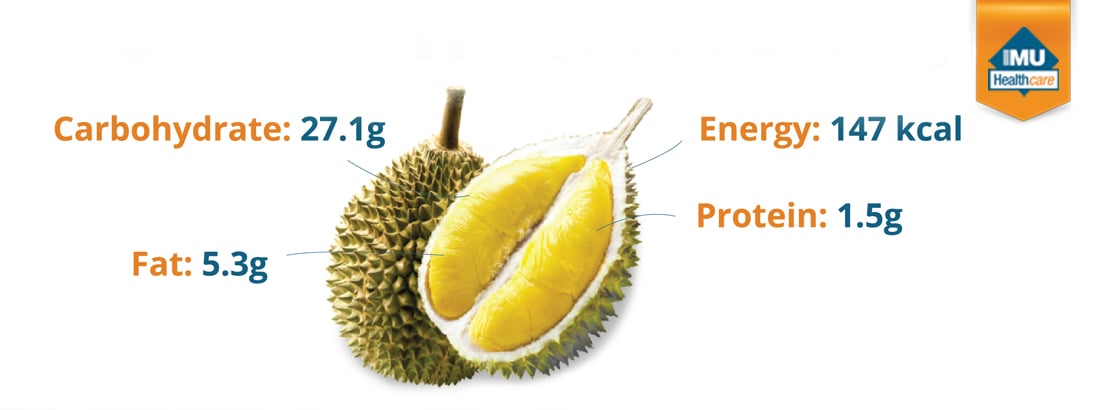



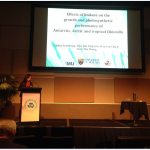

Nor Zamielia Zainuddin
Interesting post!
Mustafa
Very interesting and infact i was looking for a detailed article on durian, got it now…..thanks
IMU News
We’re glad you found this article useful 🙂